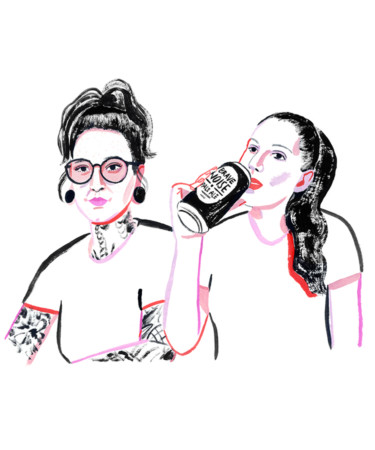This article is a part of our inaugural Next Wave Awards. For the full list of 2021 winners, check out the whole series here.
Before Brave Noise became an international beer collaboration with 100-plus participating breweries, it was a singular pale ale brewed in Massachusetts. This was in June, one month after former Notch Brewing Co. brewer Brienne Allan’s May 2021 Instagram story catalyzed what is widely considered the beer industry’s biggest “reckoning” with sexism and sexual assault against women in the workplace. (More on that here.)
Brave Noise Pale Ale attracted lots of attention, too. Brewers and community members across the country reached out right away, this time flooding Allan’s inbox with a question: Would you want this to be a collaboration?
“She came to me and I was like, ‘Yes, definitely,’” Ash Eliot, Brave Noise co-founder and founder of Women of the Bevolution, says. Today, as Brave Noise collects VinePair’s Next Wave Award for collaboration of the year, it counts close to 130 professional participants as well as 400 homebrewers.
The beer is not only a symbol of progress but a calling card for better, safer, more responsible, and more inclusive environments at breweries, bars, and beer businesses. It invites participants to partner with local nonprofit organizations, pointing them to resources including HR and legal consulting, harassment and diversity training, fundraising, and #NotMe, a free reporting app for employees.
Looking to past collaborations such as Black Is Beautiful and All Together, Allan and Eliot saw what was missing: accountability and transparency. So when the collaboration launched on July 7, 2021, it did so with more than good intentions. “We created a plan to not only make the beer’s statement public, but hold breweries accountable when they brewed it,” Allan told VinePair in August.
Where those campaigns cross their fingers and hope for the best, Brave Noise demands action. Before gaining access to the beer’s recipe or brand assets, applicants must first submit a code of conduct and agree to publish this upon the beer’s release. The proceeds (or a portion) must be donated to a nonprofit organization vetted by Brave Noise that aligns with the mission.
This is as strict as it is soft-hearted: “This is why we created a whole nonprofit document updating in real time. If a brewery reaches out and has a local nonprofit and wants to know, ‘Does this fit the mission?’, I’m behind the scenes,” Eliot says, answering questions and finding point people at organizations. She’s also on call to answer code of conduct queries for breweries that don’t have them. “There is that extra care to this initiative,” Eliot says. “Between Brienne and I, this is constant reeducation and reminding people we want accountability and transparency from these businesses … and we want safer spaces for women, people of color, and LGBTQ+ and non-binary individuals.”
Ultimately, Brave Noise aims to “bring down these old ways of doing things, … old practices adhering to the white men of the industry,” Eliot says. This means not excluding, overlooking, or putting workers or customers in harm’s way.
And Brave Noise is no longer a singular pale ale.
“Pale Ale is the base recipe, but we’re so open if someone wants to put their own spin on it,” Eliot says. So far this includes a sour beer, a hard seltzer, and a non-alcoholic beer Athletic Brewing announced this week. “This is the brewing industry,” Eliot says. “I’m hoping as our collaboration continues, we’ll be bringing in other types of beverages, hard kombucha and hard cider — we’re reaching far and wide, for sure.”
